- Home
- Brian Garfield
Fear in a Handful of Dust Page 6
Fear in a Handful of Dust Read online
Page 6
He waited for protest. Shirley only met his stare and in the poor light he couldn’t make out her expression. Jay picked at a toenail. Mackenzie said, “If it’s aligned due east and west the sun will never reach the bottom of the trench. We’ll be in shade all day long. Avoid sunburn and heat dehydration. Three feet below ground level the temperature can remain as much as sixty degrees cooler than it is on the surface.”
“Who told you all this?”
He’d read it somewhere in a book. He didn’t admit it. “It’s something all Navajo daddies teach their children before puberty.”
“What do we use for tools?”
“Rocks. Sticks. Your hands.”
“Straight down? This stuff’s like concrete.”
“Dig.” Mackenzie said it without force.
“Why not start walking? We could head for the mountains. If we’ve got four hours surely we can find good shade. A cliff facing north or a clump of trees or something.…”
“How far could you walk on bare feet, Jay? How much fluid have you got in your body that you could afford to burn up getting there? That’s what kills faster than anything else in this desert.”
“And digging like beavers won’t burn it up?”
“Dig slowly. Don’t work up a sweat.” Mackenzie’s hand described an impatient arc. “Which way would you walk? Forget it. It’s better to dig here—those mountains are solid rock.”
Jay studied him, full of resistance. “How do we know which way to align the trenches?”
Mackenzie found the Dipper, traced it toward Polaris. “That’s the North Star. Guide on that.”
“What about Earle?”
“We dig four trenches.”
“Why not one long one?”
“Body heat. And it’s bad enough to breathe the stink of your own sweat.…” He couldn’t face lying in the same hole with the rest of them.
There was a beat of silence. Jay said, “All right. We’ll dig. But what about water?”
“One thing at a time.”
8
While they still had the stars for a guide they scratched outlines in the earth. Mackenzie found an oblong rock that came to something like a point. He gave it to Shirley and hunted for more; finally they began to dig.
The top layer crumbled easily and took them down three or four inches but after that it was rocks and clay; it was like trying to dig through an adobe wall. He had to force himself not to slam and whack away at it. He used the rock as a pickax, breaking up the surface and then carrying away the loosened clots with his hands.
“Make the pile on the south side of each trench. It’ll help shade us.”
Eight inches down he came on the face of a boulder and wanted to shriek out his frustration. He tried to dig around it but it seemed to have no end. He had to move ten feet away and start again.
The crumpled folds of the mountains that ringed the horizons began to turn blue with shadow. A drop of sweat dripped from his nose onto the back of his hand. He forced himself to relax, slow down, dig with less effort. He remembered a time when he had been lost in the mountains and happy to be lost: he’d had a backpack and a canteen of water and no place in particular to go.
The earnest task occupied his attention and freed him from the obligation to think ahead. It took all his concentration to shape the trench. Keep the walls vertical. Dig carefully around each rock—some of them were the size of a man’s head and weighed seventy-five pounds—and lift it out and place it on the rim of the dig to absorb and deflect the sun.
He worked slowly, on his knees, right hand steadily lifting and falling like the arm of a steam hammer. Break up a layer of clay and lift it out a cupped double-handful at a time. Pack it down on the rim. Lift another. He made rakes of his fingers.
But the thought of water came relentlessly into his mind. What good was it to postpone death a few hours if there were no solution to the second question?
There was a little cactus. Staghorn cholla mostly. No water in that; it was as spindly as rib bones. In the late afternoon when the heat waned they would have to make an expedition in search of fat varieties of cactus: the barrel, the jumper, even the prickly pear could be mashed to pulp for liquid. But he doubted there’d be enough to sustain them for more than a day before they’d cleared this area of moisture-bearing cactus: he doubted there was more than one clump in each quarter acre.
Underground water? No—not within reach of the surface; otherwise there’d have been deciduous trees. He tried to remember the signs: obviously a cottonwood or sycamore meant water close to the surface; but he’d seen none.
The light strengthened. He examined the country.
It was a surrealist landscape. Spotted scrub writhed on the bare tan-yellow plain. The ground was desolated by drought, naked and barren. A few miles away in any direction lilac hills undulated toward mountains that loomed in tilted tiers of gray and blue and cayenne red.
The most common growth he saw was creosote: greasewood bushes with their leaves dark oily green. He remembered desert horseback trips, his father taking him out of Chinle for camping and hunting weekends. A horse wouldn’t eat greasewood. It suggested poison.
Keep it in mind.
He saw tall spindly fans of ocotillo. Nothing there but solid dry stalks of brittle wood clothed in spines.
The little hat-sized clumps looked like sagebrush but they weren’t. Saltbush, he recalled; you could tell by the yellowish-green color—it didn’t have the pastel blue hue of sage.
Twenty yards down the slope he could make out a manzanita shrub by its gnarled red bark. More of them farther out along the desert. No help there either.
Catclaw everywhere: the weed of the desert. A bush in size and shape. No nourishment or moisture in it.
Grass in odd spotted clumps: sometimes a single blade of it, sometimes a bouquet. The tips had gone to tufted wheatlike seed pods. Yellow and dry.
Maguey—the century plant. Tall stalk, sunflower top. Blades around its base like a palm tree. The Mexicans made beer and liquor out of the maguey. Might get moisture by pulping it. Worth a try anyway. He saw six of them within walking distance.
He counted nine jumping-cholla clumps in a hundred-yard circle. There was one barrel cactus higher along the hill; it looked skinny—they only fattened after a heavy rain—but it was the nearest thing to a life-saving supply of water he could see within reach. That would be the first target.
The Senita would be next. It was an organ-pipe cactus only about two feet tall but fleshier than most varieties.
It meant they were definitely in Arizona; the Senita grew throughout northern Mexico but in the United States it was found only in Arizona near the border. They weren’t in Mexico; they’d neither crossed at a border station nor cut their way through a fence.
All the while he kept digging. The sun appeared.
A breeze, much hotter than before, raked him with its sinister caress. He began digging the second trench. Jay was helping Shirley at the fourth dig. Mackenzie scraped the chalky topsoil away and began to cut into the earth with his stone. His fingernails were cracked; blood had congealed on one thumb.
The sun began to flush him; it drew the sweat out of him. A sense of urgency quickened his breath. He had to fight it down.
Toward the east the earth glittered as if perspiring: mica particles, pyrites, quartz in the rocks picking up the sun’s reflection. A small lizard darted toward shade.
Under his hair the scalp prickled with sweat. He stopped work and returned to his first trench and lay in it to cool off. The earth around him was damp and thick with a musty redolence. He watched the sky—cloudless, pale. A bird passed high overhead with a steady slow wingbeat.
After a few minutes he crossed the twenty feet to the slope where Jay and Shirley were digging. The hole was more than two feet deep. All he could see was their heads and shoulders until he was up close: they’d built up the parapet.
He interrupted. “Jay can finish this. Have a look at Earle’s leg,
will you?”
He saw she was trembling. Exhaustion, fear, hopelessness. He gave her a hand up. Jay looked up at him, wearing an expression of black fury.
Mackenzie watched Shirley pick her way toward Earle Dana, who had not moved in the past hour.
Jay grunted with the effort of lifting a stone out of, the pit. “I don’t know what good it’ll do her looking at his leg.”
“She’s the only one among us who’s used her M.D.”
“He needs splinting, right? We haven’t even got the equipment to splint him. Sticks, sure, we can break off sticks—but what do we tie them with?”
“Shirley’s hair.”
Jay gaped at him. “My God.”
“You’d better lay off down there—that looks deep enough.”
Jay sat back weakly against the wall of the pit. The sun only reached his face. His hairy legs were as spindly as a colt’s: you could see every bone. He had no fat to live on.
Something glittered in the corner of Mackenzie’s vision. At first he disregarded it, taking it for another bit of desert glare. Then he turned and had a better look. He moved off.
“Where are you going?”
“Brass collecting.”
“What?”
He walked slowly, picking spots for his feet. What time was it anyway? Six? Half past six? The sun was three diameters above the horizon. This early it wouldn’t burn the skin badly. He kept walking toward the dazzling yellow reflection, searching to either side of it for more metal.
They’d come tumbling out of the sky, falling ten thousand feet or more, and they’d spread themselves out in an uneven row across the desert—two shells quite close together, then forty yards away another and far beyond that he saw the glimmer of yet another.
He picked up the two at his feet. They’d be enough for the time being; he didn’t use the energy to walk farther. He turned and went back up the slope.
Thirty-caliber aerial machine-gun shells. No telling how long they’d been out here. Everything was metric nowadays: millimeters.
“What the hell good are those supposed to do us?”
“We’ve just moved from the Stone Age into the Bronze Age.”
He kept the shells in his hand and walked right past Jay across the slope to where Earle lay asprawl with his mouth open and his eyes shut. Shirley looked up. “It’s shock. I think. He’s still chilled—you can see the goose bumps.”
“Can we move him into one of the holes without torturing him?”
“Maybe if all three of us carry him. One of us on the broken leg.”
“We’ll splint it tonight.”
“Sam—is there any point? Can he possibly live long enough to care whether it heals?”
“There aren’t any guarantees but we all took the Hippocratic Oath.”
“Earle was never an M.D.”
“Well he hasn’t got a vote anyway, has he.”
She said, “I didn’t think you were putting things to a vote.”
“I had to sound tough. We’d never get anywhere if Jay felt duty bound to dispute every instruction I gave.”
“We almost made it,” she said. He couldn’t tell if there was bitterness in her solemnity. “We were almost finding out how to be content together.”
“I didn’t come back by choice, did I.” He wheeled from her.
He heard her say, “What a grisly waste.” He went a few paces away and put the two brass shells down and beckoned to Jay, who came reluctantly out of the pit and walked forward with his eyes on the ground, toes curled protectively, avoiding stones and stickers.
“We’ll pick him up very carefully and put him in that nearest trench. Shirley takes the bad leg. Jay takes the good leg. I take the head and shoulders.”
“It’ll wake him up,” Jay warned.
“He can’t stay here.”
Even in his unconsciousness Earle Dana’s mouth was pinched into a prim pout. Very gently Mackenzie crouched down and got his hands under the shoulders. “Ready?”
“Wait.” Shirley was testing the leg, trying to find exactly where the break was without disturbing it. He watched her make her decision: she slid one hand in under the calf just below the knee and gripped the ankle with the other hand. “Now I’m only going to hold this leg. I’m not going to support any of his: weight.”
“Understood,” Mackenzie said. “You give the word.”
“All right. Slowly—now. Lift.”
Ever so slowly he pulled Earle’s shoulders up off the ground. Earle’s arms swung wide and flopped like dead wings. Jay had him under the small of the back with his left forearm; Jay’s right hand gripped the underside of Earle’s knee. In that manner they picked him up. Shirley’s face pinched with concentration as she held the: two sections of the broken leg, trying to maintain the separation and distance of the break so that the jagged bone ends wouldn’t grate or penetrate the flesh. Internal bleeding had already taken place; the injured leg was bruise-black from knee to heel and swollen half again the thickness of the right leg.
A sharp stone jabbed Mackenzie’s heel when he put his foot down but he couldn’t shift it without breaking the rhythm of their walk. He put his weight on it and went on.
They lowered him with infinite patience into the trench, climbing down one at a time with him.
It was when they put him down that something happened, a twist or pull that shot pain through Earle explosively: he cried out in a bellow that climbed to a scream.
There was instantly: the stink of excrement.
Earle blinked at them, heat-flushed, panting with agony and weakness and disoriented terror. “What—?”
Shirley touched his forehead with her palm. “Take it easy, Earle. Try not to move. Try to relax.”
“You’re burying me!”
“It’s to keep the sun off. Keep you cool.”
“Duggai—”
She said, “You two go on. I’ll talk to him.”
Mackenzie climbed out of the hole. He stood facing Jay across the open grave. Two grown men standing bare-ass naked with their privates dangling ludicrously. “Get under cover, Jay. Stay there until late afternoon. Sleep if you can.”
“And then?”
“Then we’ll find something to drink.”
“I’m already parched beyond belief.”
“You’ll make it.”
“Jay’s mouth twisted. “Sure. Hang in there. Keep on truckin’. Stiff upper lip. Act like a man. Mackenzie, aren’t you even just a little bit terrified?”
Mackenzie walked back to pick up the machine-gun shells. He took them to the farthest trench. He hadn’t finished scooping it out; he picked up his digging stone. The sun, early yet, prickled against his back.
He made himself dig with slow measured movements until it was deep enough. He had husbanded his energy; all the same he was panting in short bursts and oiled with sweat.
He lay down in the pit with the brass cartridge cases and the digging stone. He dug a plate-sized rock out of the wall: it would do for an anvil. He had no idea if it was going to work but it had to be tried because otherwise they’d be trying to chop open spiny cactus with bare hands and pulling Shirley’s hair out by the roots.
Lying back in the trench he squinted at the blazing sky. His tongue and eyelids were gritty. They had at best the chance of a snowball in hell, he thought, but he was a prisoner of his morality. Wonder stabbed him: his grandfather had taught him too well. I guess I’m a good man in spite of myself. A fine discovery now that it was too late to matter. He felt himself smile at the irony.
Leaning up on one elbow he began to work the brass.
9
He had only read about such things and the pit amazed him as the sun climbed. If anything, he felt chilled against the dark moist clay.
He knew it would be best to lie quiet until evening but there was too much that had to be done.
The brass was something he could do without leaving the trench.
The large rock served as his anvil. He stood one
.30-caliber shell upright on its base. He upended the second shell and held it on top of the first one with the necks overlapping, slightly askew. He lifted the second rock and pounded it down.
The brass lips crumpled a bit. He hadn’t hit very hard; hadn’t wanted to chance ruining it.
He struck again. The lower rim crumpled more, bending in on itself, but the upper shell began to split and that was what he was after.
He pulled at the split with his fingernails but the metal was too hard for him. He placed the shells muzzle-to-muzzle again and hammered away, stopping after each blow to inspect the work. The split worked its way up the length of the shell, the second shell acting as a wedge driving deeper with each blow.
Each shell was about four inches long. When the split had traveled two-thirds the length of its casing he stopped hammering and tried to pull the two casings apart but they were wedged together and he had to think about that for a long sluggish time before he saw that he was going to need a third shell to finish the job.
He sat up slowly. The molten sun exploded in his face. What time? Nine o’clock? Couldn’t be much later than nine yet. Possibly only half past nine; hard to tell by the angle of the sun—his celestial navigation was rudimentary.
Worth a few minutes’ risk, he decided. He left the hole and went down the slope, remembering where he’d seen the other casings. He gathered three of them before he made his ginger way back onto the slope. In these few minutes the skin of his back had already begun to cook.
Approaching the trench he heard a groan higher along the slope. Earle.
Mackenzie went that way and crouched at the rim of Earle’s pit. The stench of excrement came up out of the hole. Earle was revolted by the fact that he had fouled himself; he wouldn’t look Mackenzie in the face.
Mackenzie climbed down, wedging himself into the narrow trench. “Roll over on your left side just a little, can you? I’ll get this out of here.”
Wordlessly Earle lifted himself on his right elbow until a wince of pain crossed his face.
“That’s high enough. Just hold it there a minute.”
He used the handful of shells as a digging tool to scrape around the moist pool of human manure. He dug in an arc and lifted the crumbling half-ball of earth, sliding it out from under Earle’s upraised knee, lifting it to the rim of the trench and setting it down there. It had taken several minutes and Earle sagged back in exhaustion.

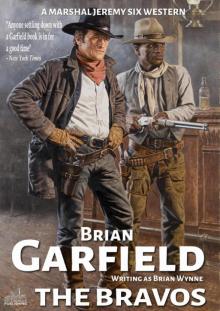 Marshal Jeremy Six #3
Marshal Jeremy Six #3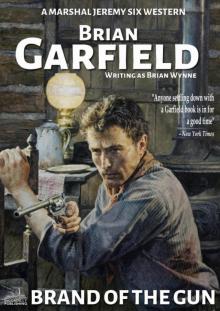 Marshal Jeremy Six #6
Marshal Jeremy Six #6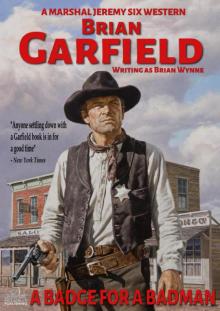 Marshal Jeremy Six #5
Marshal Jeremy Six #5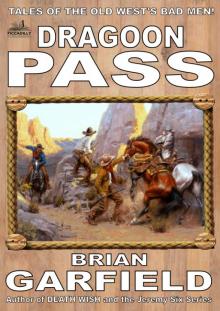 The Outlaws 2
The Outlaws 2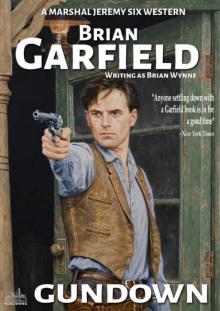 Marshal Jeremy Six #7
Marshal Jeremy Six #7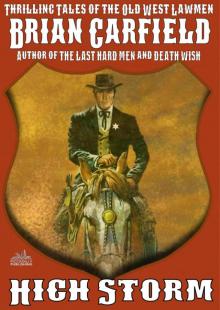 The Lawbringers 4
The Lawbringers 4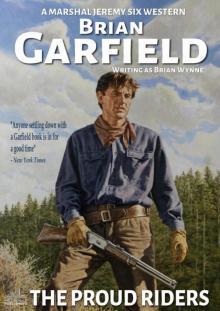 Marshal Jeremy Six #4 the Proud Riders
Marshal Jeremy Six #4 the Proud Riders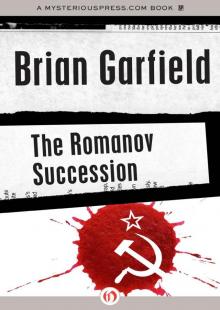 The Romanov succession
The Romanov succession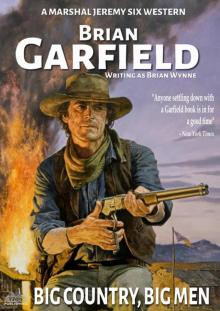 Marshal Jeremy Six #8
Marshal Jeremy Six #8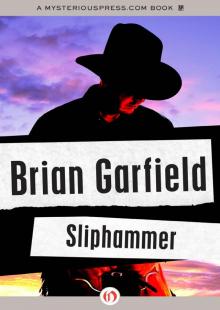 Sliphammer
Sliphammer Line of Succession
Line of Succession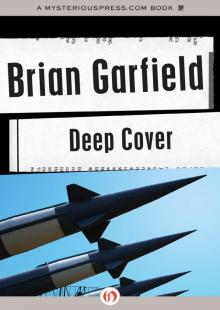 Deep Cover
Deep Cover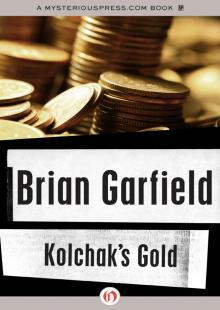 Kolchak's Gold
Kolchak's Gold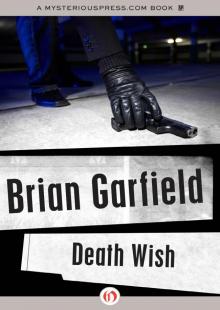 Death Wish
Death Wish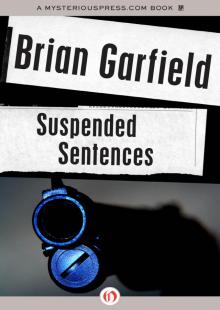 Suspended Sentences
Suspended Sentences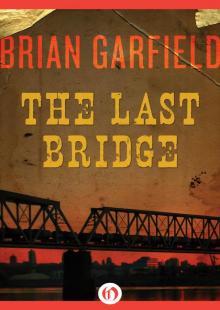 The Last Bridge
The Last Bridge Relentless
Relentless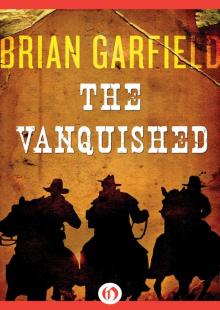 The Vanquished
The Vanquished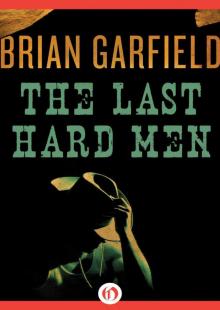 The Last Hard Men
The Last Hard Men Hit and The Marksman
Hit and The Marksman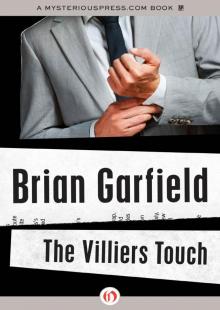 Villiers Touch
Villiers Touch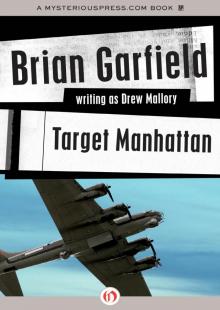 Target Manhattan
Target Manhattan Marchand Woman
Marchand Woman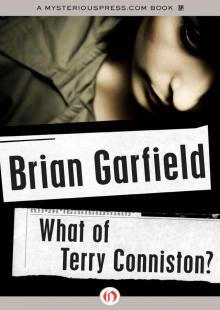 What of Terry Conniston?
What of Terry Conniston?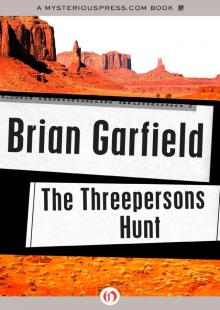 Threepersons Hunt
Threepersons Hunt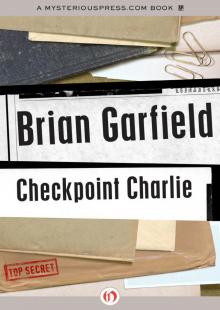 Checkpoint Charlie
Checkpoint Charlie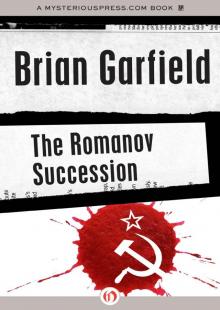 Romanov Succession
Romanov Succession Necessity
Necessity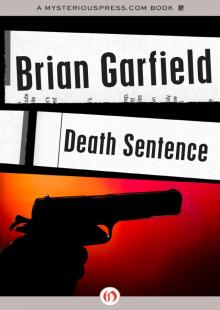 Death Sentence
Death Sentence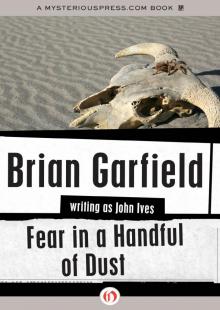 Fear in a Handful of Dust
Fear in a Handful of Dust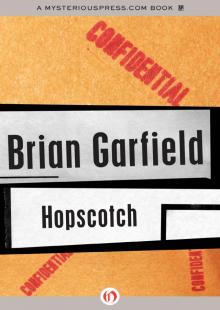 Hopscotch
Hopscotch